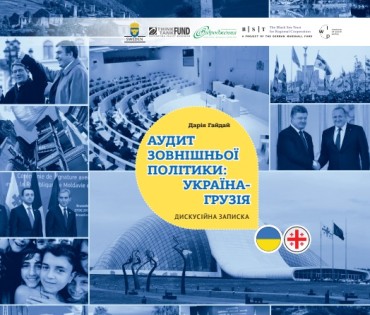A discussion paper was prepared by Daria Gaidai, Research Fellow at the Institute of World Policy.To download pdf-version of the paper click here.
INTRODUCTION
Arriving in Tbilisi, everyone sees the “Georgia is the associate member of the EU” banner at the airport. Some perceive this slogan skeptically, others — as an expression of “positive thinking” (or national branding), and those who are not interested in politics could even think they are in the European Union. Orientation toward Europe is not a new trend in Georgian politics. The idea that Georgia is part of Europe, i.e. part of the Christian world, has always been an important element of Georgian identity. Over the last two decades, Georgia has been desperate to get rid of its post-Soviet identity and association with unstable and dangerous Caucasus region. Tbilisi’s efforts aimed at escaping from the troubled region and becoming part of the European and Euro-Atlantic space, which have been critically perceived by many observers, meet less and less resistance from the Western partners today.
Aside from security motives, an important role in shaping Georgia’s pro-Western course belongs to economic considerations. Its nearest neighbors, stuck in a period of transition, had little to offer Georgia in terms of modernization and economic development. For Georgia, the path to Europe lies through the restoration and consolidation of its Black Sea identity, i.e., through strengthening cooperation with the Black Sea countries, including Ukraine. Therefore, partnership with Ukraine is a component of Georgia’s broader strategy of repositioning itself in the world to consolidate its integration with the European and Euro-Atlantic structures. But there is more to it.
Given the difference in potentials, the absence of a common border, and other factors, the partnership between Ukraine and Georgia has always been motivated politically rather than economically. The two countries were attracted by their geopolitical considerations and mutual desire to counter Russian influence and achieve closer cooperation with European countries. Georgia remembers the aid provided by Ukraine during the war in Abkhazia, as well as the support during the five-day war with Russia in 2008. However, values should not be underestimated as a factor, because the period of greatest rapprochement between Georgia and Ukraine came after democratic revolutions (2003 in Georgia and 2004 in Ukraine), which created some sense of ideological affinity between the two post-Soviet countries. Also, religion is important for Georgia. Located next to the powerful Muslim states, Georgia has always sought a Christian ally (the so-called Suliko ), a friendly state, which would help it maintain independence, identity, and relations with Europe. For a long time, this role was filled by Russia, but after the collapse of the Soviet Union, amid worsening relations between Tbilisi and Moscow, Ukraine took the place of Suliko in Georgian politics . Although Kyiv and Tbilisi do have not many interests in common today, as noted by Georgian analysts, Georgia is more closely connected with Ukraine than with other countries of the region in terms of practical dimension and values.
Ukraine’s interests toward Georgia and Georgia’s interests toward Ukraine are the same on the top level: support for the independence, sovereignty, and territorial integrity of each other and unconditional support for the implementation of the European and Euro-Atlantic aspirations of each other.
Other interests emphasized by Kyiv and Tbilisi include the following:
Ukraine’s interests toward Georgia:
• security and military cooperation to counter the aggressive policies of Russia;
• strengthening economic cooperation, including increasing Ukrainian investments in Georgia;
• expanding the soft power of Ukraine in Georgia;
• use of Georgia’s transit potential;
• learning from the Georgian experience of reforms, of policy on occupied territories and finding solutions to the issue of internally displaced persons (IDPs).
Georgia’s interests toward Ukraine:
• mutual support and coordination of activities at the international forums;
• Ukraine’s active participation in ensuring stability and security in the Black Sea region;
• increasing trade turnover and tourist flow between the two countries;
• Ukraine’s assistance in the development of Georgia’s transit potential.
The areas of cooperation of mutual interest are maritime security, transport, energy, agriculture, vocational technical education, and certain specialties in higher education.
To read the full version of the paper click here.
This report was conducted within the project of the Institute of World Policy “Ukraine’s Foreign Policy Audit”. This project is implemented with the support of the Black Sea Trust for Regional Cooperation of German Marshall Fund of the USA, and the “Think Tank Support Initiative” implemented by the International Renaissance Foundation (IRF) in partnership with Think Tank Fund (TTF) with financial support of the Embassy of Sweden in Ukraine.
The contents are those of the Institute of World Policy and do not necessarily reflect the views of the German Marshall Fund of the USA, the Swedish Government, the International Renaissance Foundation, Think Tank Fund. No part of this research may be reproduced or transferred in any form or by any means, graphic, electronic, or including photocopying or by any information storage retrieval system, without the proper reference to the original source.




Comments theme
Comments themeComments themeComments themeComments themeComments themeComments themeComments themeComments themeComments themeComments themeComments themeComments themeComments themeComments themeComments themeComments themeComments themeComments themeComments themeComments.